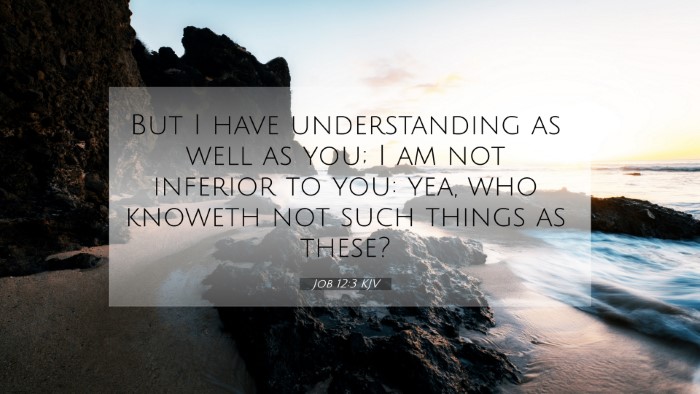Old Testament
Genesis Exodus Leviticus Numbers Deuteronomy Joshua Judges Ruth 1 Samuel 2 Samuel 1 Kings 2 Kings 1 Chronicles 2 Chronicles Ezra Nehemiah Esther Job Psalms Proverbs Ecclesiastes Song of Solomon Isaiah Jeremiah Lamentations Ezekiel Daniel Hosea Joel Amos Obadiah Jonah Micah Nahum Habakkuk Zephaniah Haggai Zechariah MalachiJob 12:3 Similar Verses
Job 12:3 Cross References
But I have understanding as well as you; I am not inferior to you: yea, who knoweth not such things as these?
Uncover the Rich Themes and Topics of This Bible Verse
Listed below are the Bible themes associated with Job 12:3. We invite you to explore each theme to gain deeper insights into the Scriptures.
Job 12:3 Cross Reference Verses
This section features a detailed cross-reference designed to enrich your understanding of the Scriptures. Below, you will find carefully selected verses that echo the themes and teachings related to Job 12:3 KJV. Click on any image to explore detailed analyses of related Bible verses and uncover deeper theological insights.

Job 26:2 (KJV) »
How hast thou helped him that is without power? how savest thou the arm that hath no strength?

Job 6:6 (KJV) »
Can that which is unsavoury be eaten without salt? or is there any taste in the white of an egg?

2 Corinthians 11:21 (KJV) »
I speak as concerning reproach, as though we had been weak. Howbeit whereinsoever any is bold, (I speak foolishly,) I am bold also.
Job 12:3 Verse Analysis and Similar Verses
Understanding Job 12:3
Job 12:3 states: "But I have understanding as well as you; I am not inferior to you: yea, who knoweth not such things as these?" This verse comes from a dialogue where Job is asserting his wisdom and understanding in the face of his friends’ accusations.
Contextual Analysis
In the broader context of the Book of Job, the protagonist is experiencing tremendous suffering and is engaged in profound discussions with his friends regarding the nature of God, suffering, and human understanding. Job's plea in this passage emphasizes his own insights and challenges the presumption held by his friends that they possess exclusive knowledge about God and righteousness.
Theological Insights
Matthew Henry's Commentary highlights how Job defends himself and asserts that he is equally knowledgeable. This call for recognition serves to counter the simplistic theology of his friends, who believed that suffering was always a sign of divine punishment.
Albert Barnes adds that Job's assertion points to the universal understanding of suffering, indicating the common human experience that transcends specific situations. Job emphasizes that all are aware of the simple truths that suffering can occur without proportional guilt.
Adam Clarke notes that the tone of Job's claim is also rhetorical. He utilizes it to draw attention to the fact that real wisdom might often go unrecognized within the confines of conventional understanding. Job suggests that his experience gives him a perspective that should not be undermined by his external circumstances.
Key Themes
- Wisdom and Understanding: Job emphasizes that knowledge and insight are not exclusive and can come from varied experiences.
- The Fallibility of Human Judgment: The discourse challenges the simplicity of equating suffering with divine punishment.
- The Universality of Knowledge: Job argues that understanding transcends status and condition.
- Challenge to Conventional Theology: Job presents a counter-narrative to the prevailing beliefs held by his friends.
Cross-References for Job 12:3
Several Bible verses resonate with the themes present in Job 12:3, facilitating a deeper understanding through comparative Bible verse analysis:
- Proverbs 20:24: "Man's goings are of the Lord; how can a man then understand his own way?" This emphasizes the limitations of human understanding.
- Job 10:7: "You know that I am not guilty; but there is no one who can rescue me from your hand." This reflects Job's awareness of his innocent suffering.
- Isaiah 55:8-9: "For my thoughts are not your thoughts, neither are your ways my ways, saith the Lord..." This reinforces the notion that God's wisdom surpasses human comprehension.
- Romans 12:3: "For I say, through the grace given unto me, to every man that is among you, not to think of himself more highly than he ought to think..." This reflects on humility in wisdom.
- 1 Corinthians 1:25: "Because the foolishness of God is wiser than men; and the weakness of God is stronger than men." This highlights the disparity between divine and human wisdom.
- Ecclesiastes 7:23: "All this have I proved by wisdom: I said, I will be wise; but it was far from me." This indicates the struggle to attain true wisdom.
- James 1:5: "If any of you lack wisdom, let him ask of God, that giveth to all men liberally..." This encourages seeking divine insight.
The Role of Scripture in Understanding Job 12:3
When studying Job 12:3, using tools for Bible cross-referencing can greatly enhance your understanding. By linking scripture and drawing connections between Bible verses, one gains a more comprehensive view of the passage's implications.
Practical Applications
To engage in effective cross-referencing Bible study:
- Utilize a Bible concordance to find related verses.
- Look for thematic Bible verse connections based on common elements such as suffering, wisdom, and human experience.
- Engage in comparative study, examining the relationships between Old Testament teachings and New Testament applications.
- Consider using a cross-reference Bible study guide to facilitate discussion on the interconnectedness of these biblical texts.
Conclusion
Job 12:3 serves as a profound reminder of the complexity of wisdom and understanding. By identifying connections between this verse and others in the Bible, believers can engage in deeper theological reflections and appreciate the rich tapestry of scriptural dialogue. The cross-references not only affirm Job's message but also invite readers to reflect upon their own understanding of suffering and divine wisdom.





